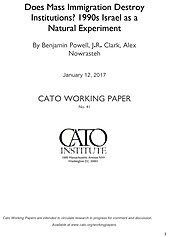The relaxation of emigration restrictions in the Soviet Union and the State’s subsequent collapse led to a large exogenous shock to Israel’s immigrant flows because Israel allows unrestricted immigration for world-wide Jews. Israel’s population increased by 20 percent in the 1990s due to immigration from the former Soviet Union. These immigrants did not bring social capital that eroded the quality of Israel’s institutional environment. We find that economic institutions improved substantially over the decade. Our synthetic control methodology indicates that it is likely that the institutional improvement would not have occurred to the same degree without the mass migration. Our case study indicates that immigrant participation in the political process is the main mechanism through which the migration caused institutional change.
Does Mass Immigration Destroy Institutions? 1990s Israel as a Natural Experiment
Benjamin Powell is Professor of Economics, Rawls College of Business and director of the Free Market Institute Texas Tech University. J.R. Clark is the Probasco Chair of Free Enterprise at the University of Tennessee Chattanooga. Alex Nowrasteh is an Immigration Policy Analyst at the Cato Institute.
